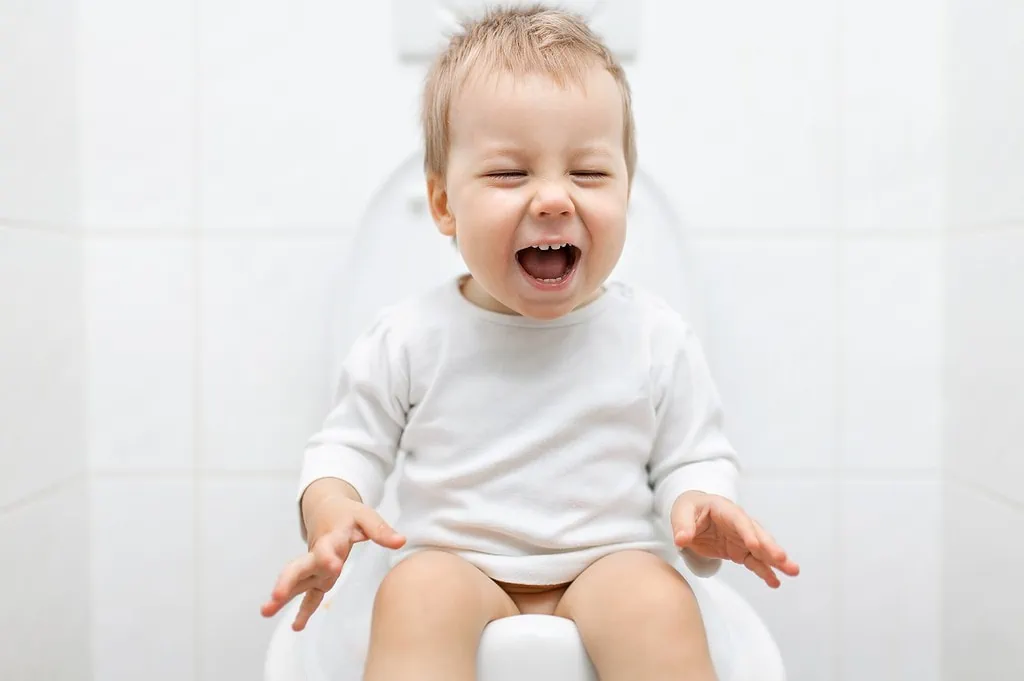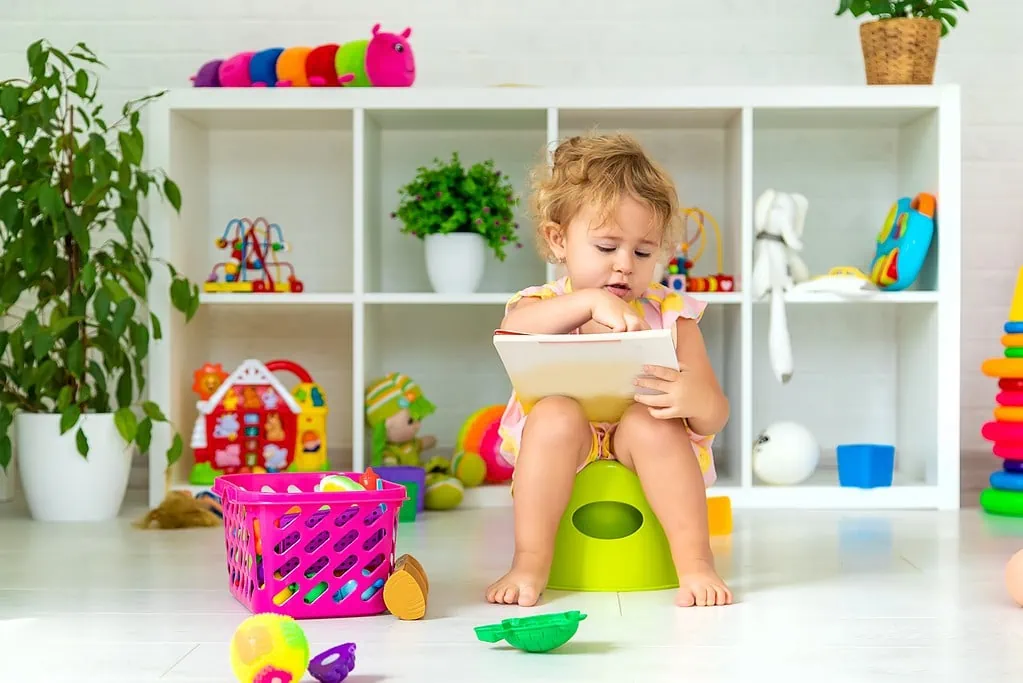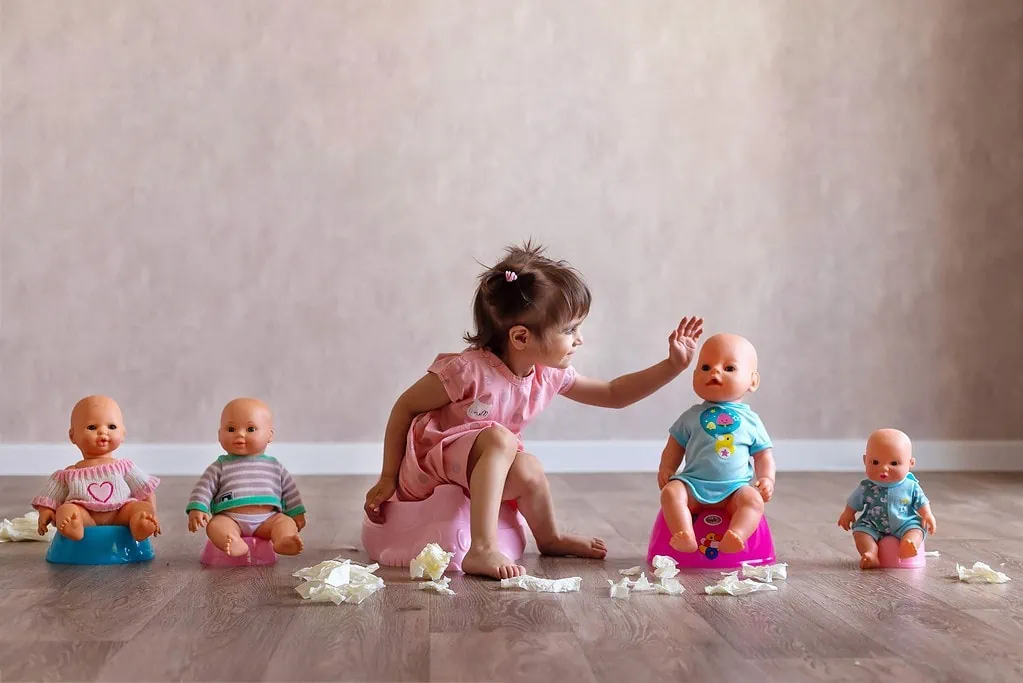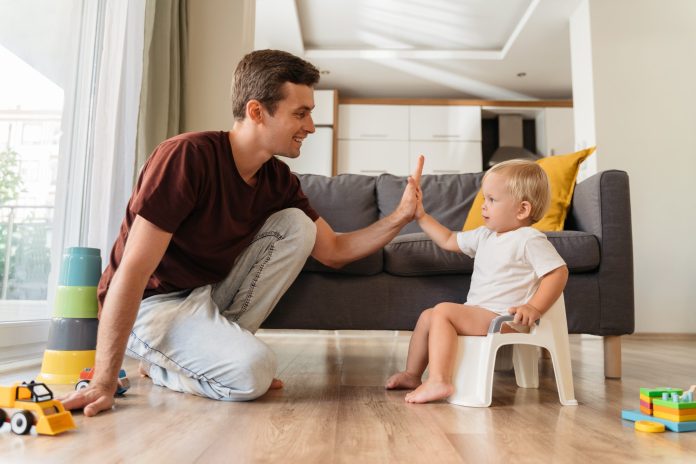Potty training is an essential milestone for every toddler. As a parent, I would say that’s also an essential milestone for me. Getting rid of those diapers and everything attached to changing the baby is a relief. Research suggests children typically say goodbye to diapers between 18 months and 2.5 years old.
What you need to know
- Potty training usually starts when a child shows signs of readiness, often between 18 months and 2.5 years old.
- Useful signs that your child is ready to start potty training include staying dry for longer, recognizing the need to use the bathroom, and showing interest in using the toilet.
- Transition tools like training pants act as excellent aids during this phase; they resemble underwear but with added absorption layers.
- Some children might face delays or fears during potty training for various reasons – emotional issues or medical conditions. Patience, reassurance, and professional guidance can help overcome these challenges.
- Even though most children typically stop wearing diapers between the ages of 2 and 3 years, every child’s timeline varies; there should be no pressure over this milestone. Celebrate each journey instead!
When to Start Potty Training

Potty training is a significant milestone in your child’s life. This process starts when you perceive developmental readiness in your little one. There are obvious signs indicating the right time to start potty training, such as interest in using the toilet or discomfort with soiled diapers. Such as learning colors or how to count to ten, these milestones are extremely important for your child’s happiness and mental health.
Understanding these signals from your child makes the transition easier and smoother for both of you.
Understanding developmental readiness
Your child’s developmental readiness is crucial in determining the right time to start potty training. It involves both physical and emotional maturity. Physical readiness is when your child can control their bladder and bowel movements, which often happens between 18 months and 2 years of age.
Emotional readiness means your child shows interest in using the toilet, unhappiness with dirty diapers, and a desire for independence. Understanding these signs helps provide insight into whether your kid might be ready to ditch the diapers!
Signs that your child is ready to start potty training
Knowing important signs of readiness can help you know when your child is ready to start potty training. These key indicators include:
- Your child stays dry for an extended period, usually at least an hour or two.
- They are aware of urinating and can communicate this fact to you.
- There’s recognition of the bodily functions related to toilet usage, a crucial aspect of child development.
- Your little one demonstrates noticeable communication skills by indicating or telling you about their need to go to the bathroom.
- Demonstration of interest in using the potty chair or regular toilet.
- Continually requesting diaper changes after soiling them.
Transitioning Away from Diapers
Making the leap from diapers to potty can feel daunting. Start by introducing your child to training pants; they’re great transition tools that mimic underwear. Remain patient and consistent, even during setbacks, as pressure or punishment can delay potty training.
Acknowledge any fears your child may have about using the toilet or saying goodbye to diapers; these feelings are normal and will pass with time and reassurance. Lastly, if your child experiences ongoing issues with toilet independence – such as constipation or other medical concerns – reach out to a healthcare provider for guidance.
Tips for successfully getting rid of diapers
Transitioning away from diapers is a major milestone in your child’s life, but it can also be challenging for parents as well. Here are some strategies that can help to make the process easier:
- Start potty training as soon as your child shows signs of readiness. Every child is different, so don’t rush this step.
- Make sure you have all the necessary supplies on hand before you start the potty training journey. This includes a toddler-friendly potty, a step stool, easy-to-remove clothing, and plenty of wipes for cleaning up accidents.
- Introduce pull-up diapers during this transition phase. They’re designed to feel more like regular underwear, which can motivate your child to use the potty.
- Set a regular toilet schedule and stick to it as much as possible. Consistency helps children understand what’s expected of them.
- Celebrate each successful trip to the bathroom with praise and small rewards if desired. Making them feel proud of their accomplishment motivates them further.
- Remember that nighttime training often takes longer than daytime training, so be patient and start using pull-ups for nights when your child is consistently dry during the day.
- Deal promptly with any fears or anxieties your toddler may have about using the toilet by offering reassurance and demonstrating how everything works.
- If medical issues such as constipation or bladder control problems could affect potty training, seek advice from your pediatrician or healthcare provider early on.

Using training pants
Transitioning from diapers to training pants marks a significant step in your child’s toilet training journey. Your little one will feel more independent, and you’ll love not having to change messy diapers! Training pants are like “big kid” underwear but with added layers for absorption, perfect for catching any accidents.
They’re easy to pull up and down, empowering your tot to take charge of their bathroom breaks. Try introducing training pants during the day first, as nighttime dryness often takes longer.
If your toddler is already poop-trained – some babies can even start this as early as five months old – it’s time to say goodbye to those bulky diapers! Be patient and remember that every child progresses at their own pace.
With consistency and positive reinforcement, they’ll soon be ready for real underwear before you know it!
Addressing potty training delays and fears
Potty training delays and fears can be a significant hurdle during the diaper-free transition. Emotional issues often contribute to these challenges, causing anxiety and resistance in your little one.
These fears may stem from negative toilet experiences or stressors unrelated to toileting. Persistence, patience, understanding, and reassurance are crucial to help your child conquer these obstacles.
Ensure they understand there’s no rush; going at their own pace will make the process less intimidating.
Evidence-based solutions can come in handy when addressing delayed potty training problems. For instance, positive reinforcement, like praise or rewards whenever they attempt or successfully use the toilet, can work wonders for motivation levels!
Seeking advice from pediatricians might be required if medical problems interfere with potty training progress—a common culprit is recurrent urinary tract infections that make urination painful.
Stay calm throughout this journey—each child is different, and mastering new skills takes time!
Dealing with any medical problems that may affect potty training
Health conditions can indeed delay the potty training process. Certain medical issues like urinary tract infections, constipation, or even developmental disorders such as Down syndrome could impact your child’s ability to gain full bladder control.
Professional guidance becomes paramount in these situations.
Parents should not hesitate to seek medical advice if they suspect their child’s delayed milestones in potty training arise from underlying health issues. An experienced pediatrician will advise on appropriate toilet training techniques and incontinence management, ensuring that medical conditions don’t hinder this important milestone.
Timely treatment helps mitigate primary enuresis (bedwetting), enabling your little one to transition smoothly from diapers.
The Average Age for Stopping Diapers
While there’s a wide range of ages when children typically stop wearing diapers, it’s usually between the ages of 2 and 3 years. However, every child is unique, so we’ll discuss how to celebrate each milestone and not feel pressured by timelines.

Age ranges when children typically stop wearing diapers
As a parent, it’s important to understand the typical range of ages when children stop wearing diapers. Here’s a helpful table that breaks down that information:
| Age Range | Description |
|---|---|
| 18 – 24 months | Potty training generally begins around 24 months of age. While some children might be ready to start transitioning away from diapers at 18 months, the average age for starting this process is closer to two years. |
| 24 – 30 months | The average age for toilet training is 27 months. The use of disposable diapers typically ceases around 26 months of age in children with primary enuresis, when the child has never had a prolonged period of being dry. |
| Above 30 months | Many children are fully trained and stop wearing diapers between 30 months and three years of age. However, children should ideally be between 18 months and three years old before they are ready for toilet training. |
Remember, each child is different, and what works for one might not work for another. Girls usually start potty training earlier than boys. Patience is critical during this transitional phase.
Celebrating the differences in every child’s potty training journey
Every child dances to their beat, especially when making the leap from diapers to using the potty. Some get into the groove as early as 18 months, while others take slightly longer, and that’s perfectly okay.
Variety spices life up, so we should celebrate these differences instead of comparing our child’s progress with others.
Often, girls start their potty training journey a little earlier than boys, but remember this is not about winning a race. It’s about acknowledging your child’s maturity and readiness for an extraordinary life milestone! Each child is exceptional in its own way and grows at its own pace; let us embrace this uniqueness he/she brings.
Every child’s journey to diaper independence is unique and should be celebrated. Parents can successfully navigate this growth stage by understanding their readiness signs, using transitional steps like training pants, and patiently dealing with any delays or fears.
Being diaper-free doesn’t have an exact age limit as it greatly depends on the child’s development. So it’s important for parents not to rush the process but to provide support wherever needed to promote their baby’s confidence in independent toileting.
